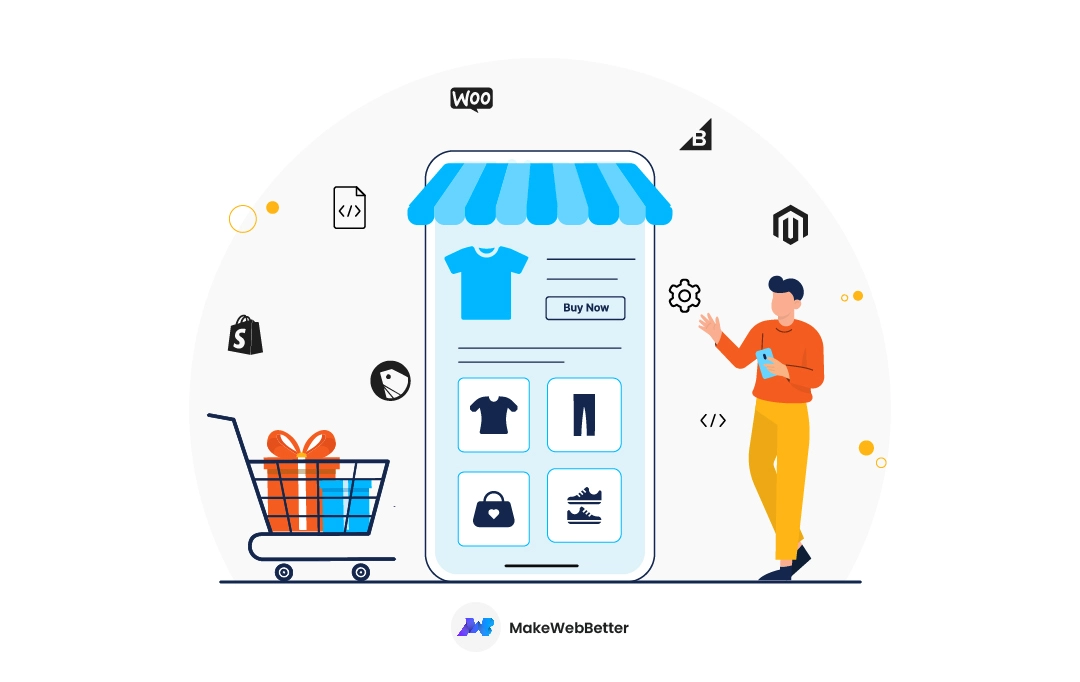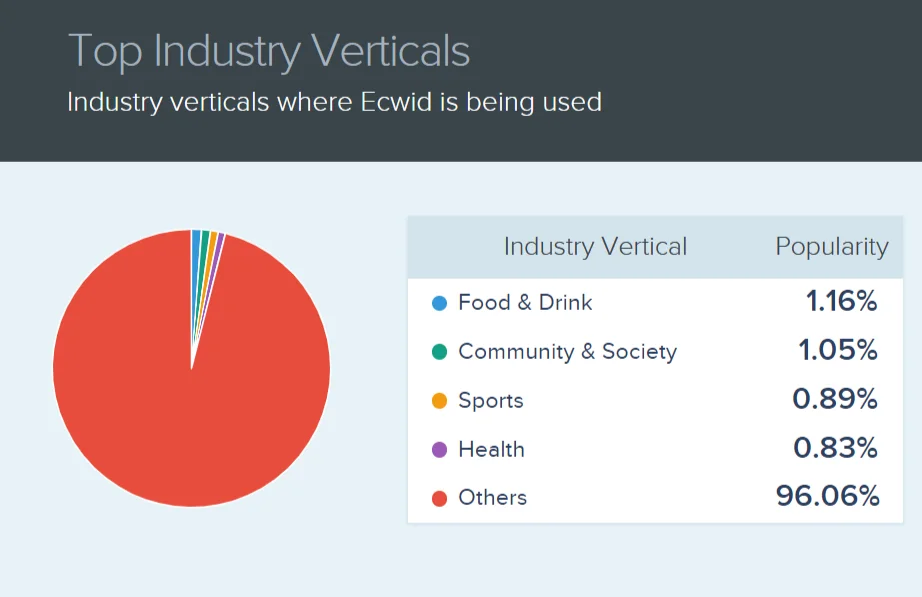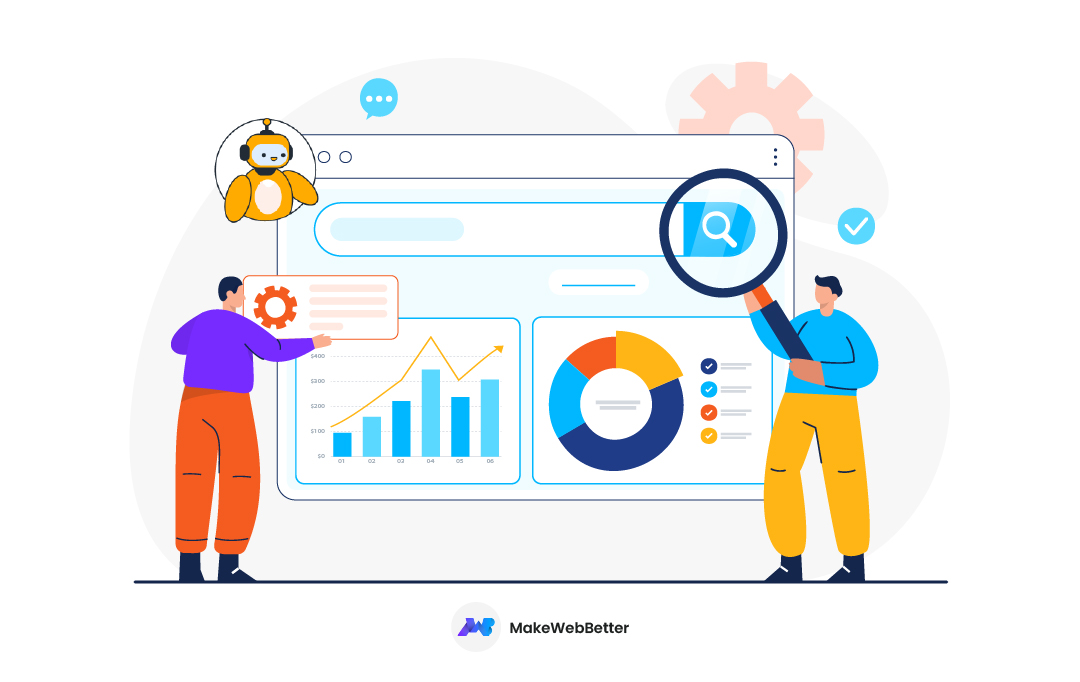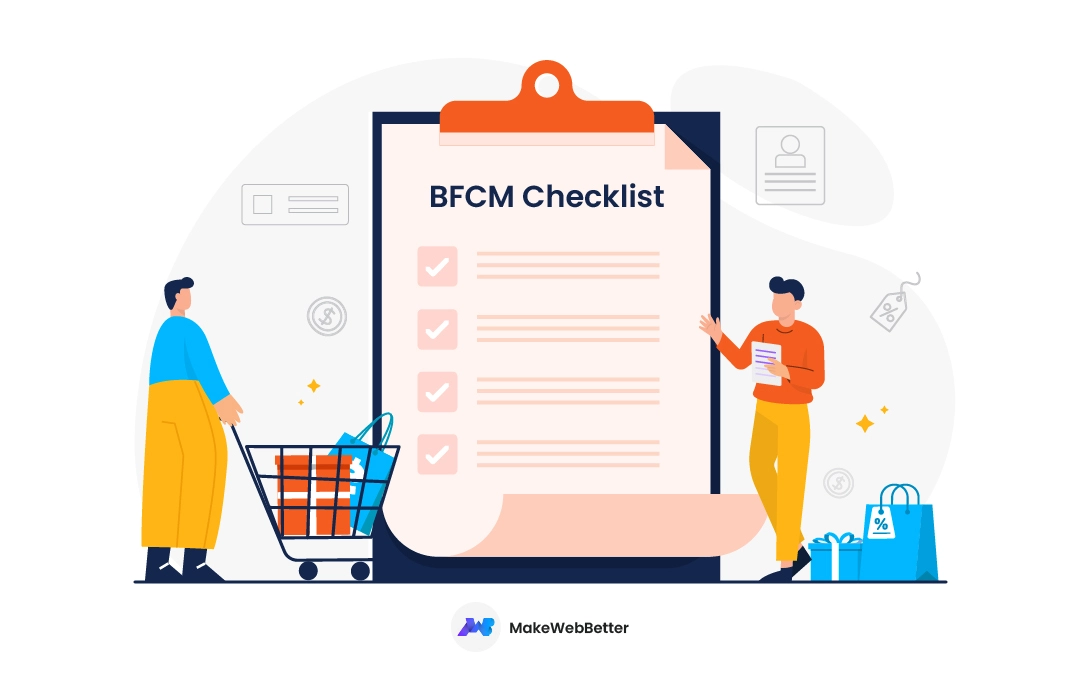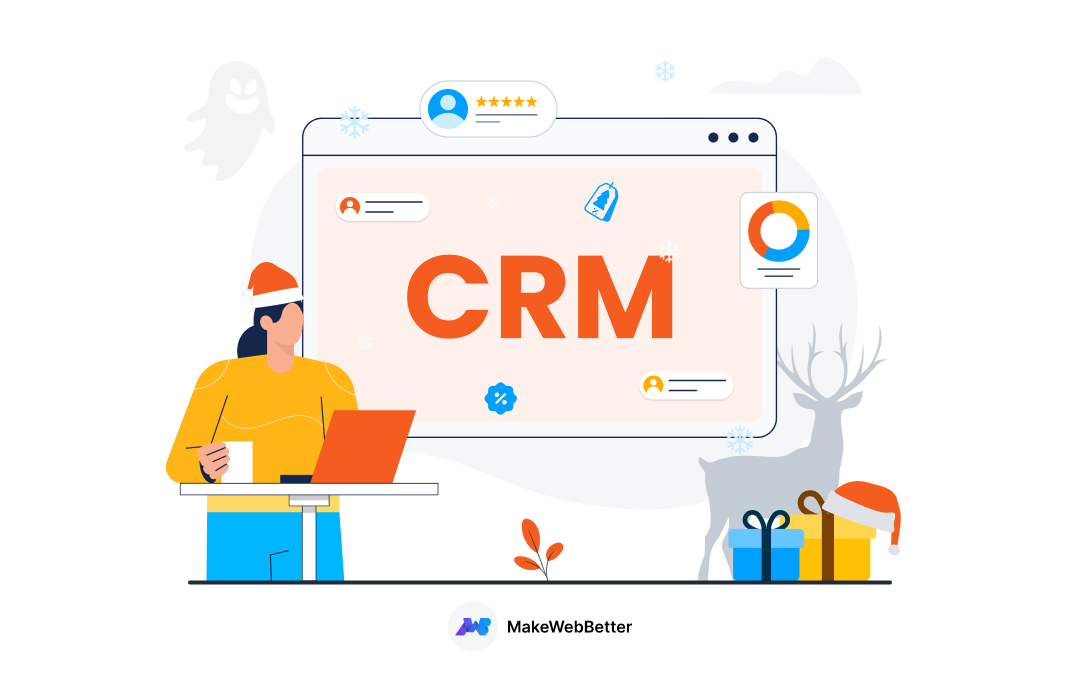1.564% of the websites are using WooCommerce, which makes it the greatest of the best eCommerce platforms in the entirety of the webspace.
However, Shopify has to be given some advantage here, as it shares 0.915% of the entire web. The landscape of the top 10 eCommerce platforms looks promising with more of these marvelous eCommerce technologies to supplement and cater to unique business models.
Top 10 eCommerce Platforms for Small Businesses:
- Bigcommerce
- PrestaShop
- Ecwid
- X-Cart
- Squarespace
- Opencart
- Wix eCommerce
- WooCommerce
- Shopify
- Magento
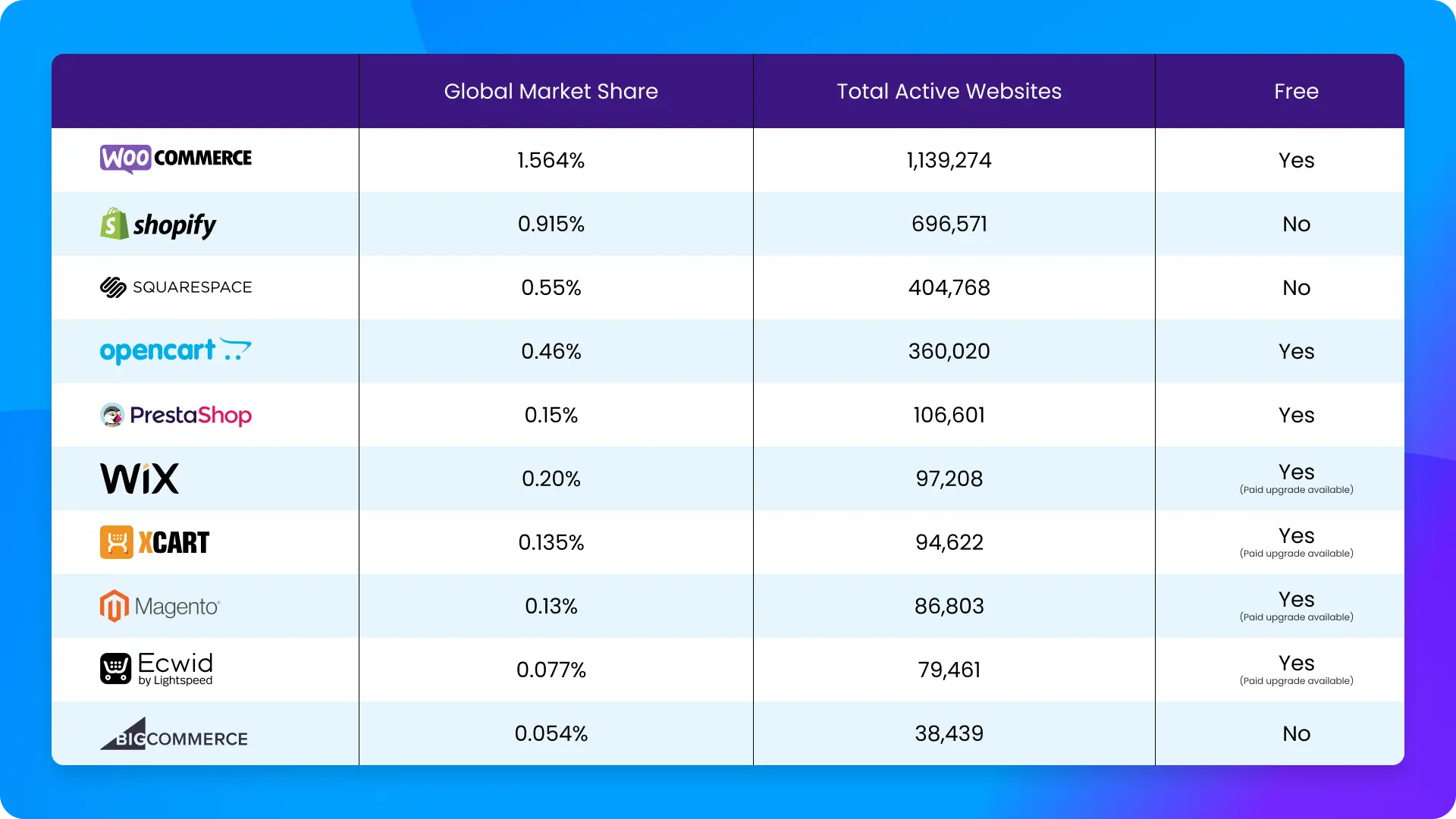
So, we will be exploring these to find out the best eCommerce platforms for small businesses. Before we do, let’s first find out which eCommerce technologies are there and what an ideal eCommerce solution looks like. Let’s begin!
How to Choose The Best eCommerce Platforms for Small Business?
Choosing the right one from the best eCommerce solutions is essential. Most importantly, you should look for features that align with your business needs and goals. Here are the features that the best eCommerce platforms for small businesses have:
- Scalability According To Business Size: The best eCommerce solutions for small businesses would be able to capacitate business growth, increasing traffic, products, and transactions without compromising performance.
- Shipping & Order Management: Efficient shipping and order management features are crucial. In this case, look for the best eCommerce software that facilitates eCommerce automation tools to streamline these processes.
- Product & Inventory Management: An effective product and inventory management system ensures easy operations. Opt for top eCommerce solutions that allow easy cataloging, real-time inventory tracking, and stock-level alerts.
- Payment Processing: Choose a platform with multiple eCommerce payment gateways and secure methods to cater to diverse customer preferences, convenience, and trust.
- Contact Management: Efficient CRM tools and features are essential for robust targeting, managing customer relationships, personalizing communications, and keeping track of customer interactions and preferences.
- eCommerce Marketing Platform & Automation: Integrated eCommerce marketing platform and eCommerce automation can drive engagement, improve conversion rates, and boost eCommerce sales by streamlining email campaigns, social media posts, and customer segmentation.
- Mobile Optimization & Localization: Ensure the technology you choose offers responsive design for mobile devices and supports localization of your eCommerce store for a seamless shopping experience anywhere.
- Integrations & Omnichannel Capabilities: The best eCommerce platforms for small businesses support integrations with various tools and offer omnichannel capabilities.
- Design & Customization: Concurrently, look for customizable templates and design flexibility. This allows your eCommerce website to reflect your brand identity.
- Security & Data Protection: Prioritize the eCommerce technologies with robust security measures and compliance with data protection regulations for maintaining trust and avoiding breaches.
Types of eCommerce Platforms
Open-Source eCommerce Platforms
The open-source eCommerce technology is used by the best eCommerce solutions for small businesses such as PrestaShop & WooCommerce, allowing developers to customize and extend the platform’s functionality as needed. Indeed, these platforms are often usually free to use but may require technical expertise and development resources.
| Advantages | Disadvantages |
| Flexibility with ease of access | Updates and security |
| Quick to setup | Technical complexity |
| Active community | Limited official support |
SaaS eCommerce Platforms
The best eCommerce platforms that use SaaS (Software-as-a-Service) technology, are BigCommerce, Ecwid, Shopify, and more. These cloud-based platforms provide web hosting, payment processing, and other eCommerce features. Undeniably, These platforms are typically easy to set up and use, with lower upfront costs and ongoing fees. However, they may be less customizable than self-hosted or open-source platforms.
| Advantages | Disadvantages |
| Easy setup and maintenance | Limited customization |
| Lower upfront costs & monthly subscription | Dependency on provider |
| Integrated services | Data Ownership and Control |
Hosted eCommerce Platforms
Top eCommerce platforms such as Shopify, BigCommerce, and Wix use Hosted eCommerce solutions. These are all-in-one solutions that provide web hosting, website development, payment processing & assist in eCommerce operations. This type of eCommerce technology is easy to set up and use and typically has lower upfront costs. However, they may be less customizable in contrast to other types of platforms, and you may need to pay ongoing fees for features such as additional storage or bandwidth.
| Advantages | Disadvantages |
| Top-notch security | Dependency on customization & optimization |
| Site maintenance provided by the host | Limited Customization & Vendor Lock-in |
| Best storefront with zero to minimum efforts | Less Control & Painful Migration |
Self-Hosted eCommerce Platforms
Self-hosted eCommerce solutions, such as Magento, WooCommerce, and OpenCart, require you to purchase your own web hosting and domain name, and you’ll need to install and manage the software yourself. These platforms offer more customization options and control over your eCommerce website, but require more technical expertise and may have higher upfront costs.
| Advantages | Disadvantages |
| Data Ownership | Customer Service Management |
| Total Control | Technical expertise |
| Customization as expected | Expenses for security, backend management, domain & software licenses. |
Headless eCommerce Platforms
The headless technology is used by a few of the best eCommerce platforms for small businesses, such as Shopify Plus, BigCommerce, and many other top eCommerce platforms. In brief , this eCommerce technology separates the front-end user interface from the back-end functionality of the platform. Meaning, you can use any front-end technology to build your website or mobile app with greater flexibility and customization options. However, headless platforms may be more complex to set up and require technical expertise.
| Advantages | Disadvantages |
| Multi-Channel Support | Complexity |
| High Scalability | Higher costs |
| Design Flexibility (Separate Frontend & backend connect via API) | Customization limitations |
Top 10 eCommerce Platforms for Small Businesses
You may find similarities in the below-discussed top 10 eCommerce platforms as all serve the same purpose. But you have to decide which one’s the perfect choice as per your business model, size, technological requirements, and resources.
So, here are all the best eCommerce solutions for small businesses that you may employ for ultimate scalability & convenience.
BigCommerce – Best eCommerce Solution for Small Businesses
Share on Web – 0.054%
Technology – SaaS
Free – No
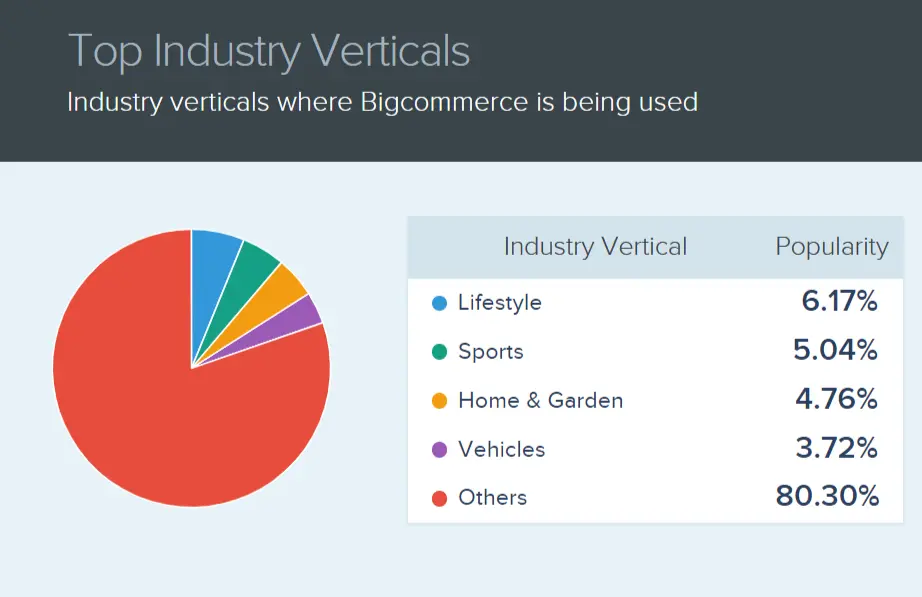
BigCommerce is a SaaS eCommerce platform. As a SaaS-based eCommerce solution, it provides a hosted eCommerce solution where you can build and manage your online stores without needing to install or maintain any software on your servers. Furthermore, BigCommerce offers a range of customizable themes and templates, allowing you to create visually appealing online stores without extensive coding knowledge.
Unquestionably, BigCommerce is one of the best eCommerce platforms that provides small businesses with features like payment processing, shipping integration, and marketing tools. It’s a scalable platform that can grow with the business.
Managing Marketing with BigCommerce Integration
The right eCommerce marketing platform will take you further than online selling. Build your brand alongside HubSpot BigCommerce integration. Connect now.
PrestaShop – Solution for Appealing Websites
Share on Web – 0.15%
Technology – SaaS
Free – Yes
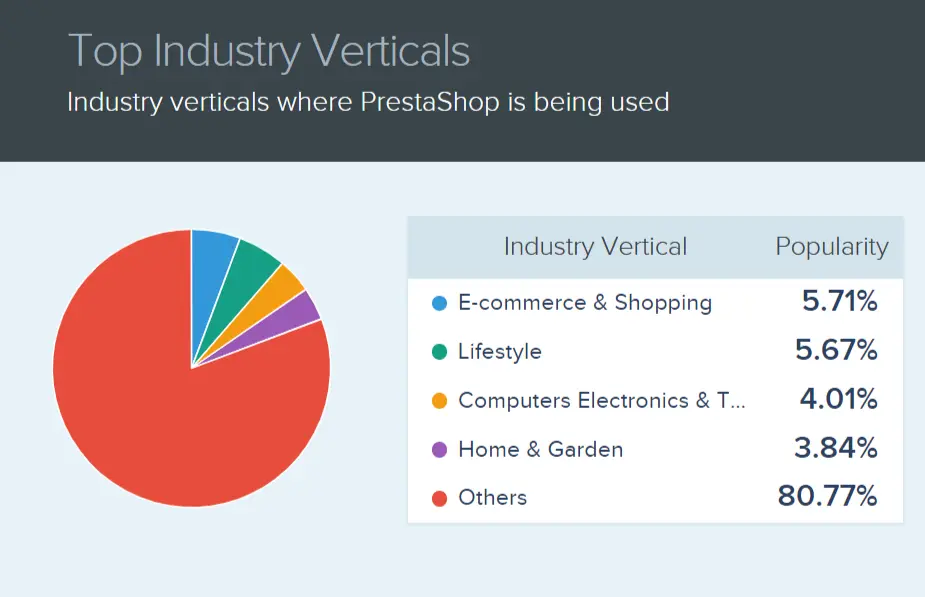
PrestaShop was conceived to easily build websites upon its foundations, making it an extremely customizable and best eCommerce software without a doubt. Conversely, it is particularly suitable for small businesses and entrepreneurs who want a high degree of control over their e-commerce platforms. And, it’s free!
You can technically use Prestashop without add-ons and integrations. In addition to this, you get over 3,000 templates that you can choose from. Furthermore, it is filled with exciting free features such as unlimited product listings, multi-store management, multi-language, multi-currency capabilities, and more.
Ecwid – Best for Existing Sites
Share on Web – 0.077%
Technology – SaaS
Free – Yes (Paid upgrade available)
Ecwid by Lightspeed is a SaaS eCommerce technology that specializes in providing seamless integration for existing websites. As a SaaS solution, Ecwid provides a cloud-based platform that is remotely accessible to you all the time to create and manage your online stores. Without a doubt, it’s one of the best eCommerce platforms if you do not want to build a new online shopping platform from scratch and repurpose your existing website.
Of course, it offers a plugin but the widget-based approach allows you to add an online store to your current website or social media pages with ease. Furthermore, Ecwid can be embedded into various website platforms, including WordPress, Wix, Weebly, Joomla, Squarespace, and others.
X-Cart – Best for Non-Technical
Share on Web – 0.135%
Technology – Open-Source & SaaS both
Free – Yes (Paid upgrade available)
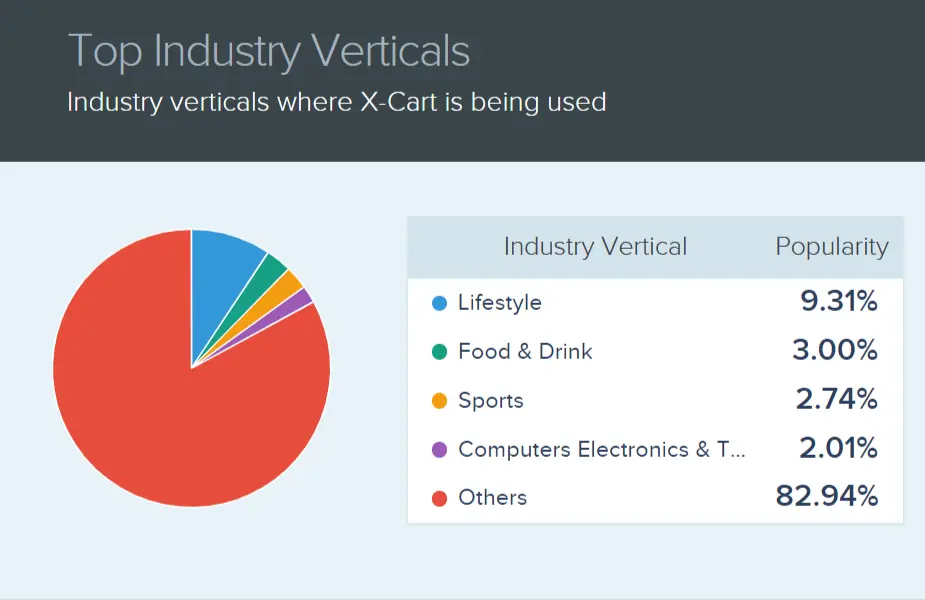
Surprisingly, X-Cart provides both open-source and hosted (SaaS) solutions for building and managing online stores. It has an open-source version, known as X-Cart Classic, and a SaaS-based eCommerce solution called X-Cart Cloud.
X-Cart Classic naturally allows complete control over the online store’s code and hosting environment. And with X-Cart Cloud, you can create and manage your online stores on X-Cart’s servers. Consequently, the latter eliminates the need for self-hosting and technical maintenance.
X-Cart Cloud provides all eCommerce management tools offered by open-source version offers but with the added benefits of managed hosting, security, and technical support. Evidently, it is a more convenient option for small businesses that prefer not to handle the technical aspects of hosting and server management.
Squarespace – Best for Omnichannel Selling
Share on Web – 0.55%
Technology – SaaS
Free – No
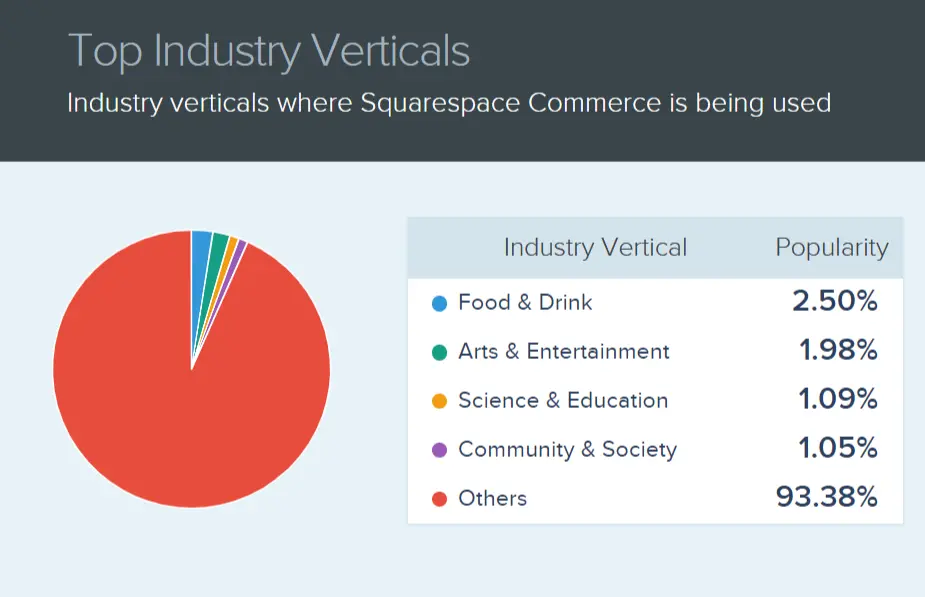
Squarespace is a website builder that also offers e-commerce capabilities. It is popular among those who appreciate visually appealing websites alongside an effortless drag-and-drop builder, setting it apart. There are tons of stunning modern website templates that are aesthetically pleasing and fully customizable. Moreover, all the premium Squarespace templates are mobile-responsive, which proves crucial in today’s mobile-first world.
Squarespace offers various pricing plans, including a Commerce Basic plan starting at $28 per month. Website building, hosting, and domain registration are all also included in a single package. This platform also supports multichannel selling and offers features like recurring billing, email marketing, and social media integrations. Evidently, Squarespace is particularly suitable for small businesses and entrepreneurs who prioritize design and ease of use.
Opencart – Best for Small Businesses
Share on Web – 0.46%
Technology – Open-Source
Free – Yes
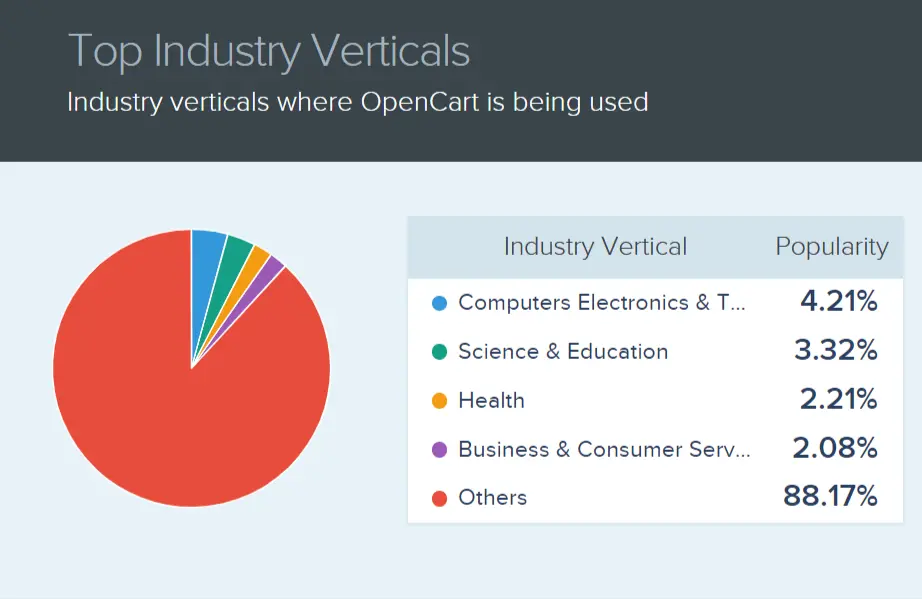
Opencart brings a versatile mechanism that helps you build a website suited to your needs. The open-source e-commerce platform offers a free version with optional paid upgrades available. Clearly, Opencart is highly customizable, with thousands of extensions and themes available to enhance its functionality.
It is particularly suitable for small businesses and entrepreneurs who want a high degree of control over their e-commerce platforms. Moreover, Opencart is known for its lightweight nature, resulting in faster page load times and improved performance. Subsequently, this proves beneficial for providing a smooth and fast shopping experience for your customers.
WiXeCommerce – Best Drag-and-Drop Editor & SEO
Share on Web – 0.20%
Technology – SaaS
Free – Yes (Paid upgrade available)
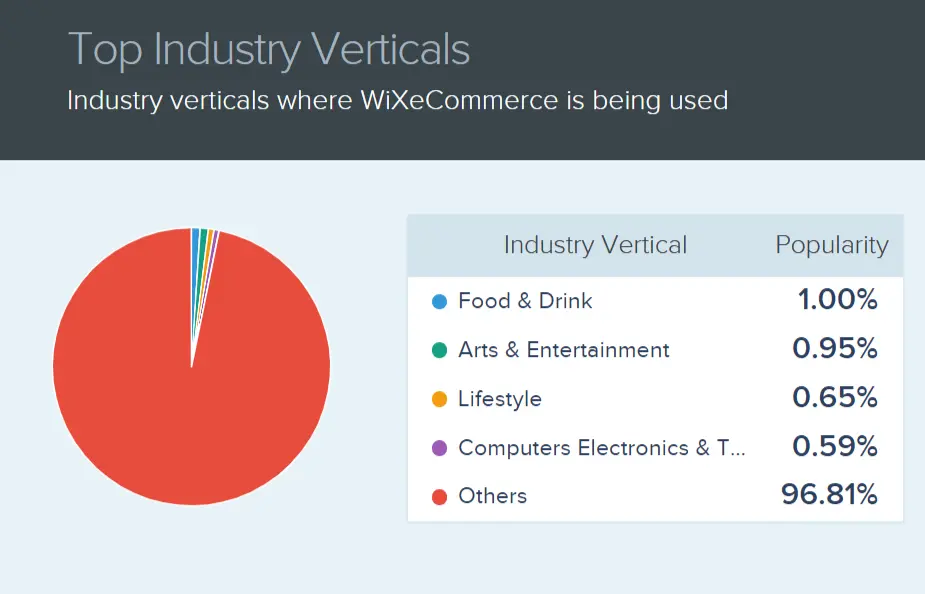
Wix is a cloud-based website builder, known for its user-friendly interface, and extensive customization options. It allows users to create professional and visually appealing websites without requiring extensive coding or design skills. Moreover, It provides a user-friendly drag-and-drop website builder with a range of features.
If you are eager to quickly start selling your products then Wix is your go-to option. Without a doubt, it is suitable for individuals and small businesses looking to establish their online presence quickly and easily. In addition, Wix provides website hosting and built-in security measures, such as SSL encryption, protects user data, and maintains a secure browsing experience.
WooCommerce – Best for Versatility
Share on Web – 1.564%
Technology – Open-Source
Free – Yes
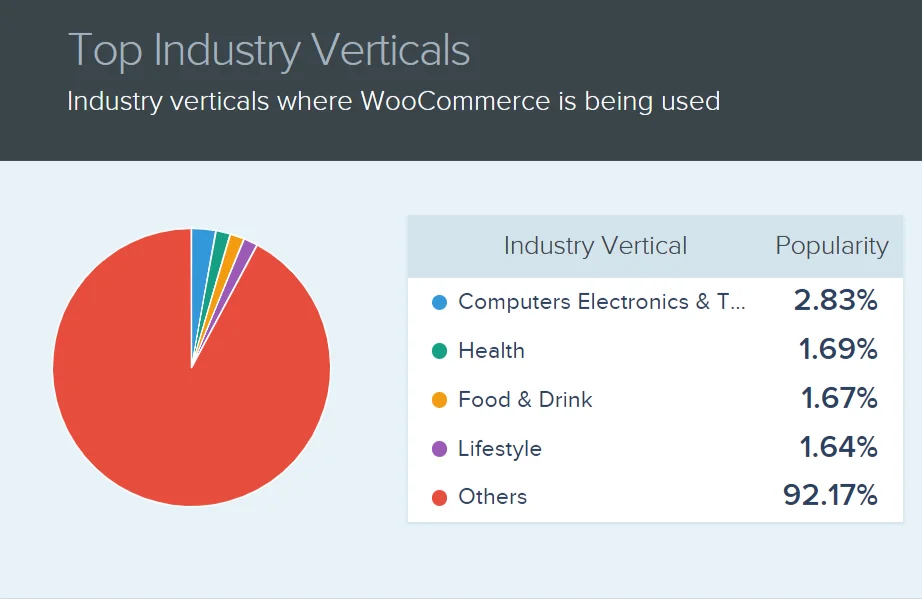
The open-source eCommerce plugin, WooCommerce, is for WordPress website users looking to convert them into eCommerce stores. It’s free and highly customizable. WooCommerce offers a comprehensive suite of tools & features for eCommerce management. Bringing hosting, storefront management, free SEO, shipping integrations, inventory management, payment processing, and analytics.
However, additional features and integrations for WooCommerce marketing & more incur added costs that are not included in the WooCommerce free plan. These include eCommerce marketing platform tools, SSL, targeted customer segmentation, multi-language stores, custom checkout fields, B2B features, and more.
WooCoomerce Integration For CRM
Fulfill your eCommerce marketing goals alongside WooCommerce integration with HubSpot and streamline daily operations & maximize reach.
Shopify – Best in Everything
Share on Web – 0.915%
Technology – SaaS
Free – No

Shopify eCommerce platform is a leading SaaS-based e-commerce platform that is only 2nd to WooCommerce in terms of popularity and users. However, it exceeds the latter in terms of upgrades at regular intervals. The platform offers various pricing plans, including a basic plan starting at $29 per month. It provides a comprehensive suite of tools to set up and customize online stores without requiring extensive technical knowledge.
Besides complete eCommerce store management, the Shopify eCommerce platform is known for its multichannel selling capabilities, including online stores, in-person sales, social media, and marketplaces. This is why it is widely used by small businesses and eCommerce entrepreneurs due to its ease of use and robust features. Moreover, Shopify’s well-versed dropshipping management, detailed sales tax tools & best-in-class POS add more to its USP.
Magento – Best for B2B & B2C
Share on Web – 0.26%
Technology – Open-Source
Free – Yes (Paid upgrade available)
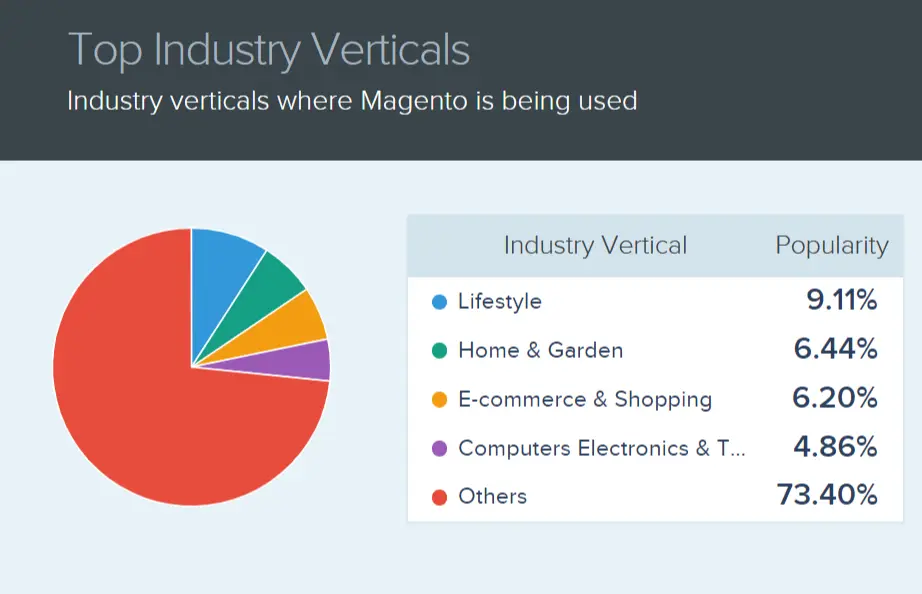
Magento is one of the best eCommerce platforms that’s known for its robust features and scalability. It’s a flexible platform that can be customized to fit the needs of small businesses and provides seamless Magento eCommerce store creation. Moreover, it can handle high traffic volumes, large product catalogs, and complex operations, providing a robust infrastructure that can scale to accommodate eCommerce growth.
There’s Magento 1 & Magento 2 also, which are more popular than Magento and equally important. In summary, Magento 2 offers more advanced and best eCommerce software. The whole bundle makes it a preferred choice for businesses looking to start new eCommerce projects or upgrade their existing Magento 1 stores.
A CRM For Magento eCommerce
Looking for ways to integrate an eCommerce marketing platform through Magento? Look no further, connect your Magento store with HubSpot for more targeted efforts.
Honest Opinion!
BigCommerce & Opencart are best for small businesses, but they require an upfront fee. While PrestaShop is absolutely free and great for aesthetic online shopping platforms, the free Wix offers a user-friendly drag-and-drop interface. On the other hand, Ecwid offers a widget-based approach providing seamless integration to revamp existing websites.
To stand out, Squarespace & X-Cart facilitate the best omnichannel platform and multivendor option respectively. In addition to this, Magento, WooCommerce, & Shopify eCommerce platforms are very promising eCommerce website solutions to stay ahead of the competition and they give you a complete package to lead.
No matter what you choose, learn thoroughly about your needs. Also, inspect your current situation and how you can achieve the result you foresee with minimal effort. Feel free to connect!

